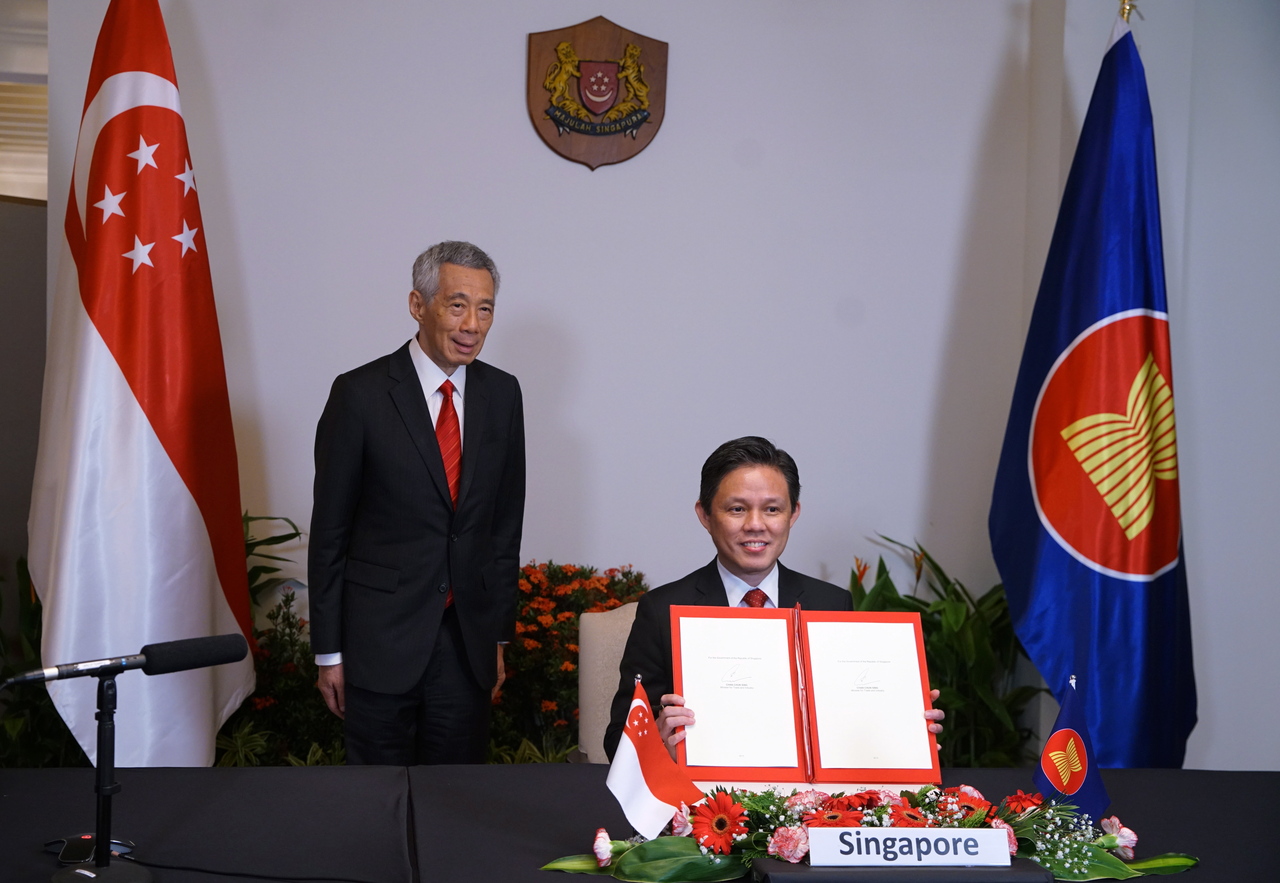Easier, cheaper for Singapore companies to do business regionally with RCEP: Chan Chun Sing
Sign up now: Get ST's newsletters delivered to your inbox

Trade and Industry Minister Chan Chun Sing (right), together with PM Lee Hsien Loong, showing off the document after the RCEP signing ceremony on Nov 15, 2020.
PHOTO: MCI
SINGAPORE - Companies will soon find it easier and cheaper to conduct business in the region when the newly-inked, region-wide free trade pact takes effect, said Trade and Industry Minister Chan Chun Sing on Sunday (Nov 15).
Speaking to reporters after signing the Regional Comprehensive Economic Partnership (RCEP), Mr Chan said the agreement provides businesses with better intellectual property protection and enables them to consolidate their production across participating countries, which will lead to cost- and time-savings.
"We expect the RCEP countries to offer themselves as an integrated market for investment, especially at a time when the global supply chains and global production chains are being reshuffled because of technology and geopolitics," he added.
Consumers, too, will see benefits with a more competitive range of products to choose from, as well as cost-savings passed down from the elimination of tariffs on most goods traded among participating countries, said Mr Chan.
The RCEP was signed virtually by all 10 Asean members and key partners Australia, China, Japan, South Korea and New Zealand on the last day of the annual year-end Asean Summit hosted by Vietnam, which also handed over the chairmanship of the grouping to Brunei.
Together, the RCEP countries account for 30 per cent of the global economy and one-third of the world's population. Singapore's trade value with the other 14 RCEP members has grown steadily over the years, reaching 50.4 per cent or S$515.2 billion of the Republic's global trade last year.
The agreement's key benefits include tariff elimination for at least 92 per cent of goods traded among members, and allowing businesses to invest in fellow RCEP countries without having to meet conditional performance requirements.
As a result, businesses handling chemicals, plastics and processed food could see cost savings for their exports especially to China, Japan and South Korea.
Express consignments and perishable goods also have to be cleared by customs within six hours of arrival.
Non-traditional areas which are not in some existing trade pacts, such as e-commerce, competition policy and intellectual property, are also included in the RCEP.
Meanwhile, consumers' personal data will be protected when shopping or carrying out activities online, and cross-border electronic signatures and transactions more widely accepted.
The pact also provides for enhanced intellectual property protection and enforcement. For example, Singapore companies need only file a single patent or trademark application that would apply in other RCEP members.
There will also be greater clarity and transparency for firms seeking government projects, with members agreeing to publish laws, regulations and procedures on such opportunities.
RCEP members are also obliged to share information that may be relevant to small and medium enterprises so that they can benefit from the agreement.
As for concerns some have raised about benefits being tilted in favour of larger economies, like China, Mr Chan said the signing of the RCEP will bring about mutual benefits for both Chinese companies venturing beyond the domestic market, as well as for non-Chinese companies who want to enter China.
It will also allow for both the Chinese and regional markets to be seen as an integrated market, which will make the grouping more attractive to global investors and enhance the competitiveness of its exports to the rest of the world, he added.
Mr Chan described the RCEP as an important geostrategic initiative that will further regional economic integration, adding that its signing is a timely boost to the region's longer term prospects.
"It will place the region at the forefront of the global economic recovery and remain as an attractive investment destination during and post-Covid-19," he said.
He also urged members to accelerate efforts to ratify the RCEP, and keep the agreement relevant in line with changing realities and evolving business needs.
Singapore Business Federation chief executive Ho Meng Kit said the RCEP will enhance regional trade, which is key for Singapore's open export-oriented economy. "Singapore companies will be able to make use of regional cumulation to enjoy greater flexibility in sourcing from a larger pool of suppliers in the region," he said.
The pact's regional cumulation provisions allow businesses to include the use of raw materials and parts sourced from any of the other 14 RCEP markets as content originating here.
Manufacturers will benefit from being able to qualify for preferential tariffs more easily, added the SBF. "This will boost opportunities for supply chain diversification in the region."
In a joint leaders' statement on Sunday, the RCEP countries said they are expediting their domestic processes so that they can ratify the agreement, and will develop the RCEP as a platform for dialogue and cooperation on trade and economic issues affecting the region.
The RCEP will enter into force once six Asean countries and three partner countries have ratified the pact.
The full text of the agreement is available here.


